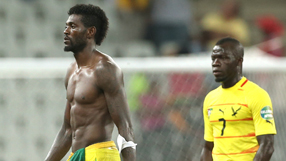Togo keep defeat in perspective after tragedy
Togo will never forget the horror of the attack on their national football team's bus at the Africa Cup of Nations three years ago, but at least they leave this year's tournament with far happier memories.

The tiny west African nation was traumatised in 2010 when separatist gunmen attacked their bus in the Cabinda province of Angola, killing three members of the squad and forcing Togo to withdraw from that year's tournament.
After failing to qualify in 2012, they have returned to the finals this year and surpassed expectations By reaching the knockout phase for the first time.
Although they lost 1-0 to Burkina Faso after extra time in Sunday night's quarter-final, the pain they suffered was confined to the playing field, and was not another national tragedy.
"We are naturally upset to have lost, but this has been a successful tournament for us," their French coach Didier Six said afterwards.
"The future is bright for Togo football. There are some good, talented youngsters coming through and we have done well here. Yes we have lost, but we have lost a football match, nothing more and we will look to the future and carry on."
The trauma of the Cabinda attack is still fresh in the memory of the players and defender and vice-captain Serge Akakpo said he never stops thinking about the people who died, and nor did he expect to play in the tournament again after surviving the shootout.
"After what happened then, I almost stopped playing for the national team. But now, we do not forget the ones that died but we play every match for them. We think of them a lot, we pray for them, they helped guide us here."
The best features, fun and footballing quizzes, straight to your inbox every week.
The Confederation of African Football (CAF) banned Togo from the 2012 and 2013 tournaments after they withdrew from the 2010 finals following the attack.
The ban was revoked only after Togo appealed to the Court of Arbitration for Sport (CAS) in Switzerland and FIFA president Sepp Blatter who put pressure on CAF to lift it.
Although they failed to qualify last year, they returned this year with a mission - to get past the group stages for the first time.
"We achieved that aim," said Six, "and I am very proud of my team. They worked hard, they were driven. We were in a group that included three former winners - Ivory Coast, Tunisia and Algeria and we qualified in second place so we did well."
Skipper Emmanuel Adebayor, the one true world-class Togolese player who has had a prolific career in the English Premier League scoring more than 100 goals for Arsenal, Manchester City and Tottenham Hotspur, played in a deeper role in Sunday's quarter-final first half against Burkina Faso.
He almost put them ahead in the second half with an effort that was cleared off the line when he moved into a more attacking role.
Adebayor was fiercely critical of the hard, sandy pitch at the Mbombela Stadium that made it difficult for both teams to control the ball, calling it "a disgrace to Africa - people are watching all over the world and they think we are playing in the Bush."
Still only 28 though, Adebayor's relationship with the Togolese football authorities is a strained one and he only played here after the head of the FA ordered Six to include him after leaving him out of the original squad.
If Adebayor continues his international career, Togo could continue the improvement they
